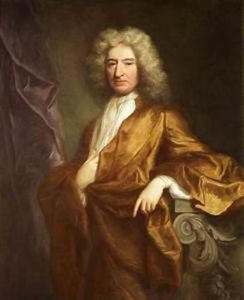
Edward Colston
*Edward Colston was born on this date in 1636. He was a white-English philanthropist, merchant, slave trader, and Member of Parliament.
Edward Colston was the youngest of at least 15 children from Bristol, England. His parents were William Colston, a prosperous merchant High Sheriff of Bristol in 1643, and his wife Sarah, daughter of Edward Batten. He was brought up in Bristol until the time of the English Civil War, when he lived on his father's estate in Winterbourne, just north of the city, for a while. The family then moved to London, where young Colston was a Christ's Hospital school pupil. He was apprenticed to the Mercers Company for eight years and, by 1672, was shipping goods from London. He built a lucrative business, trading with Spain, Portugal, Italy, and Africa.
In 1680, Colston became a member of the Royal African Company, which had held the monopoly in Britain on trading in gold, ivory, and slaves from 1662. Colston rose rapidly onto the company's board and became its deputy governor and senior executive in 1689. His parents had resettled in Bristol, and in 1682, he made a loan to the Corporation, the following year becoming a member of the Society of Merchant Ventures and a burgess of the City. In 1684, he inherited his brother's mercantile business on Small Street and was a partner in a sugar refinery in St. Peter's Churchyard, shipping sugar produced by slaves from St. Kitts. But he was never resident in Bristol, carrying on his London business from Mortlake in Surrey until he retired in 1708.
Edward Colston died on October 11, 1721, at his home in Mortlake. His body was carried back to Bristol and was buried at All Saints Church. James Gibbs designed his tomb. He died at the age of 84. A statue designed by John Cassidy was erected in the center of Bristol in 1895, commemorating Colston. Colston's name permeates many of the city’s landmarks, such as Colston Tower, Colston Hall, Colston Avenue, Colston Street, Colston's Girls' School, Colston's School, Colston's Primary School, and Temple Colston School (now part of St Mary Redcliffe & Temple School). He is also remembered, particularly by some schools, charities, and the Society of Merchant Ventures, on Colston's Day, his birthday, at a church service at St Stephen's Church. A regional bread bun, the Colston bun, is named after him.
In 1998, someone scrawled on the statue's base the name of one of the professions in which he made his fortune: “SLAVE TRADER." He is a divisive figure in Bristolian civil society, viewed by some as an inspirational figure for the city due to his donations of money to schools and other causes, but, in more recent times, as Colston's activities as a major slave trader emerged, many in Bristol and beyond, now regard him as having committed crimes against humanity. Some have called for his statue to be taken down.
In April 2017, the charity that runs Colston Hall announced that it would drop the name of Colston when it reopens after refurbishment in 2020. Protests and petitions were calling for a name change, and some concertgoers and artists had boycotted the venue because of the Colston name. Local protesters took the statue down in 2020 during the African American George Floyd murder protest.